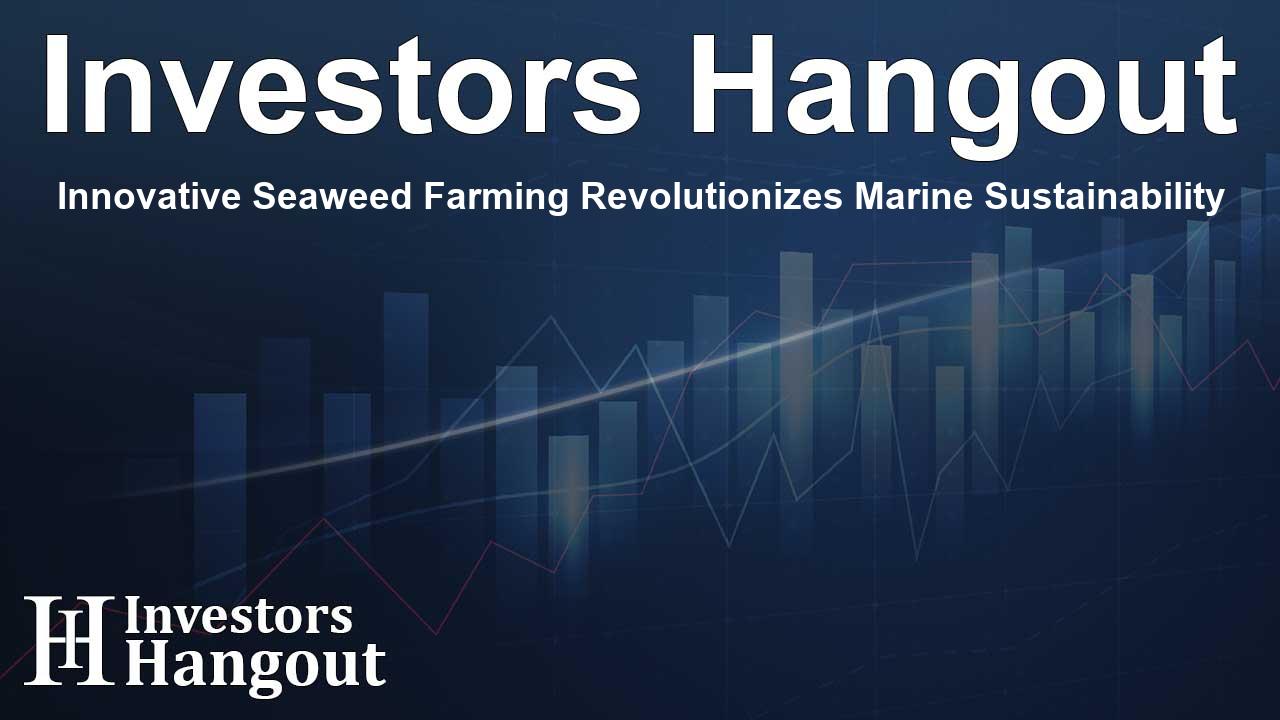Innovative Seaweed Farming Revolutionizes Marine Sustainability

Innovative Seaweed Farming at North Sea Farm 1
The world has witnessed a groundbreaking moment in marine sustainability with the first-ever harvest at North Sea Farm 1. Located amid wind turbines, this pioneering seaweed farm represents a significant leap in how we approach sustainable aquaculture. Established by North Sea Farmers, the farm has garnered attention for being the world’s first commercial-scale seaweed farm situated in such a novel location.
The Vision Behind North Sea Farm 1
North Sea Farmers launched this initiative with generous funding of €2 million, showcasing a commitment to sustainable practices and environmental stewardship. The idea was simple yet revolutionary: utilize the operational space of wind turbines to cultivate seaweed, effectively combining renewable energy generation with agricultural innovation. This unique positioning not only aids in seaweed growth but also helps minimize maritime traffic interference.
A Source of Resilience and Biodiversity
The commencement of harvesting at North Sea Farm 1 is significant for several reasons. Seaweed farming is known to have a profound impact on carbon capture, contributing positively to the fight against climate change. By growing seaweed in this environment, researchers are optimistic about the potential benefits not only for carbon offsetting but also for enhancing marine biodiversity. This innovative approach could relieve the pressures agriculture puts on terrestrial ecosystems by providing an alternative source of nutrition and materials.
Insights from the Harvest
The insights gained from this initial harvest are invaluable. Researchers are deeply interested in understanding how seaweed can be effectively cultivated in offshore environments, and what impact this has on local marine ecology. The collaboration between North Sea Farmers and research institutions like Plymouth Marine Laboratory and Deltares emphasizes the commitment to advancing both scientific knowledge and practical outcomes in sustainable farming.
Supporting Research and Monitoring
Detailed monitoring of the farm is underway, utilizing satellite data and on-site evaluations to analyze the ecological implications of the seaweed farm. These efforts are crucial, especially given the urgent need for effective climate change solutions. Professor Ana M Queirós, leading climate change initiatives at Plymouth Marine Laboratory, expressed excitement about scrutinizing the effects of this venture on marine habitats. Their research aims to meticulously track carbon flows from seawater into the cultivated seaweed, assessing the broader impact on environmental diversity.
The Future of Seaweed Farming
As we progress, the hope is that initiatives like North Sea Farm 1 will pave the way for more seaweed farms integrated within existing offshore infrastructures. The findings from this project could illuminate pathways for scaling up seaweed cultivation globally, providing a sustainable resource that benefits the environment while meeting the growing demands for sustainable food sources. According to industry experts, seaweed not only supports marine health but also has diverse applications, from culinary uses to biofuels and beyond.
Frequently Asked Questions
What is North Sea Farm 1?
North Sea Farm 1 is the world's first commercial-scale seaweed farm located between wind turbines, designed to leverage offshore wind energy infrastructure for sustainable seaweed production.
Why is seaweed farming important?
Seaweed farming plays a crucial role in combating climate change by capturing carbon, promoting marine biodiversity, and reducing reliance on land-based agriculture.
How is the farm monitored?
Monitoring is conducted through the analysis of satellite data and site visits by research teams to understand the environmental impacts and scaling potential.
Who is funding this initiative?
The farm has received funding from North Sea Farmers with support from Amazon’s Right Now Climate Fund, emphasizing collaboration in sustainable practices.
What are the future implications of this project?
This project’s success could lead to the establishment of more seaweed farms and contribute to strategies for climate resilience and marine ecosystem health.
About The Author
Contact Dylan Bailey privately here. Or send an email with ATTN: Dylan Bailey as the subject to contact@investorshangout.com.
About Investors Hangout
Investors Hangout is a leading online stock forum for financial discussion and learning, offering a wide range of free tools and resources. It draws in traders of all levels, who exchange market knowledge, investigate trading tactics, and keep an eye on industry developments in real time. Featuring financial articles, stock message boards, quotes, charts, company profiles, and live news updates. Through cooperative learning and a wealth of informational resources, it helps users from novices creating their first portfolios to experts honing their techniques. Join Investors Hangout today: https://investorshangout.com/
The content of this article is based on factual, publicly available information and does not represent legal, financial, or investment advice. Investors Hangout does not offer financial advice, and the author is not a licensed financial advisor. Consult a qualified advisor before making any financial or investment decisions based on this article. This article should not be considered advice to purchase, sell, or hold any securities or other investments. If any of the material provided here is inaccurate, please contact us for corrections.
